- Oily Scalp
- Dermatitis
- Dandruff
- Itchy Scalp
- Greying
- Hair Growth
Oily Scalp
Concerns:Dealing with an oily scalp can be frustrating, as excess oil and greasiness can lead to discomfort and affect the overall health and appearance of your hair. To manage an oily scalp effectively, it’s crucial to understand the causes and follow a suitable hair care routine.
Causes of oily scalp:
+ Overactive Sebaceous Glands: Excessive oil production by sebaceous glands can result in an oily scalp.
+ Hormonal Changes: Hormonal fluctuations, especially during puberty or pregnancy, can increase oil production.
+ Dietary Habits: A diet rich in oily and fried foods can contribute to excess oiliness.
+ Incorrect Hair Care: Using harsh or oil-based hair products can exacerbate oiliness.
Prevention:
+ Regular cleansing: Wash your hair frequently with a mild, sulfate-free shampoo to remove excess oil and impurities.
+ Use a Clarifying Shampoo: Incorporate a clarifying shampoo into your routine once a week to deep-cleanse your scalp and hair.
+ Balanced Diet: Consume a balanced diet rich in fruits, vegetables, and lean proteins to promote scalp health.
+ Avoid Heavy Conditioners: Apply conditioner primarily to the hair’s lengths and ends, avoiding the scalp.
+ Gentle Styling Products: Choose hair styling products that are lightweight and oil-free to prevent additional greasiness
If you’re interested in exploring potential solutions, please review the suggestions in the ‘Recommended Treatments’ section provided below, or feel free to reach out to our hair professionals for expert guidance.
Recommended Products
+ DRx Purifying & Scalp Refresh Shampoo
Recommended Treatments
+ DRx Purifying Scalp Therapy
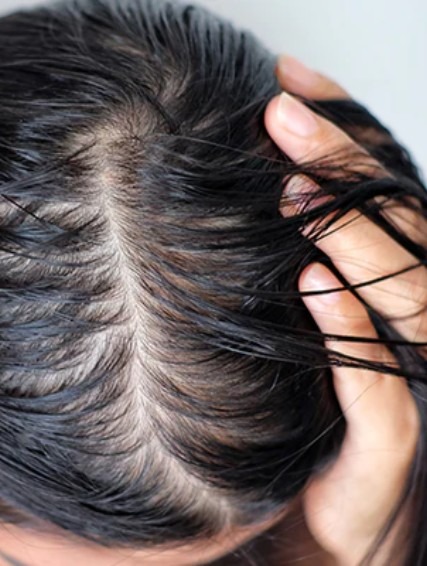
Dermatitis
Dealing with dermatitis that affects the scalp and hair can be uncomfortable and distressing, as it often leads to skin inflammation, redness, and itching in these areas. Dermatitis related to the scalp and hair can have various causes, and effectively addressing it requires a well-rounded approach to hair and skincare.
Causes of Scalp and Hair Dermatitis:
Scalp and hair dermatitis can result from several factors, including:
+ Contact Dermatitis: An allergic reaction to certain hair care products or irritants that come into contact with the scalp and hair.
+ Seborrheic Dermatitis: A common condition that affects the scalp and other oily areas of the body, resulting in redness, scaling, and excessive oil production in the scalp.
+ Atopic Dermatitis (Scalp Eczema): A form of eczema that affects the scalp, leading to dry, itchy patches, often associated with allergies or genetic factors.
Prevention and Care for Scalp and Hair Dermatitis:
To effectively manage dermatitis affecting the scalp and hair, consider these preventive measures and care tips:
+ Identify Triggers: Determine the specific triggers or irritants causing your scalp and hair dermatitis and take steps to avoid them, such as switching to hypoallergenic hair care products.
+ Gentle Hair Care: Use mild, fragrance-free hair care products and gentle cleansers to minimize irritation to the scalp.
+ Moisturize Scalp: Apply scalp-specific moisturizers to keep your scalp hydrated and reduce dryness, a common factor in scalp dermatitis.
+ Avoid Scratching: Refrain from scratching the affected areas on your scalp, as it can worsen symptoms and lead to infections.
+ Stress Management: Practice stress-reduction techniques like meditation and relaxation exercises, as stress can exacerbate scalp and hair dermatitis symptoms.
Recommended Treatments for Scalp and Hair Dermatitis:
If you are looking to address scalp and hair dermatitis concerns, consider the following treatment options:
+ Topical Steroid Creams: Prescription or over-the-counter steroid creams can help reduce inflammation and itching associated with scalp dermatitis.
+ Medicated Shampoos: Use medicated shampoos formulated to target specific types of scalp dermatitis, such as seborrheic dermatitis or scalp eczema.
+ Antihistamines: Over-the-counter or prescription antihistamines may help relieve itching and discomfort associated with scalp and hair dermatitis.
+ Consult a Dermatologist: For severe or persistent cases of scalp and hair dermatitis, consult a dermatologist who can provide tailored treatment plans and recommendations
Remember that scalp and hair dermatitis can vary in causes and severity, and individual responses to treatments may differ. It’s essential to prioritize scalp and hair health and consult with a healthcare professional or dermatologist for personalized guidance and care. If you have questions or need further assistance, our dermatology and hair experts are available to assist you.
Recommended Products
+ DRx Purifying & Scalp Refresh Shampoo
Recommended Treatments
+ DRx Purifying Hair & Scalp Therapy
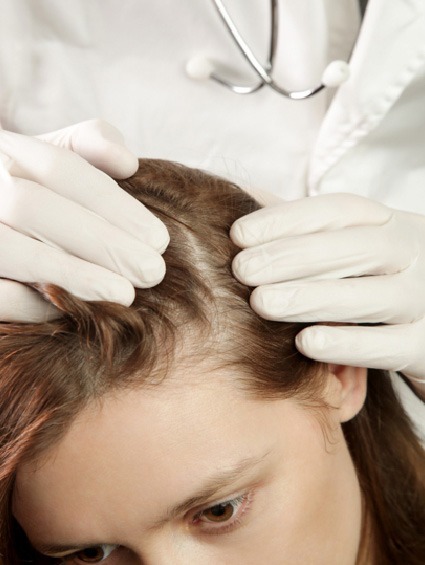
Dandruff
Dealing with dandruff can be both embarrassing and uncomfortable, as it often leads to visible flakes and scalp irritation. Dandruff can have various causes, and effectively addressing it requires a well-rounded approach to hair care.
Causes of Dandruff:
dandruff can result from several factors, including:
+ Fungal overgrowth: An overgrowth of the yeast-like fungus Malassezia on the scalp can lead to dandruff.
+ Dry Scalp: Dryness can cause flakiness and contribute to dandruff formation.
+ Sensitivity of Hair Products: Some individuals may develop dandruff-like symptoms as a reaction to certain hair care products or ingredients.
+ Seborrheic Dermatitis: A common skin condition characterized by redness, scaling, and excessive oil production, seborrheic dermatitis can lead to dandruff.
Prevention:
To effectively manage dandruff and promote a healthy scalp, consider the following preventive measures and care tips:
+ Regular Shampooing: Wash your hair regularly using an anti-dandruff shampoo designed to target the underlying causes of dandruff.
+ Gentle Massage: While shampooing, gently massage your scalp to help remove flakes and improve blood circulation.
+ Balanced Diet: Consume a balanced diet rich in vitamins and minerals to support scalp health.
+ Avoid Harsh Hair Products: Use mild, sulfate-free shampoos and conditioners to prevent further irritation.
+ Limit Heat Styling: Excessive use of heat styling tools can worsen dandruff symptoms. Use them sparingly and protect your hair with heat protectants.
Recommended Treatment for Dandruff: If you’re looking for specific treatments to address dandruff concerns, consider the following options:
+ Anti-Dandruff Shampoo: Choose shampoos with active ingredients such as zinc pyrithione, ketoconazole, or selenium sulfide to target the fungus responsible for dandruff.
+ Coal Tar Shampoo: Coal tar shampoos can help slow down the rapid turnover of skin cells on the scalp, reducing flakiness.
+ Prescription Medication: For severe cases of dandruff or seborrheic dermatitis, consult a dermatologist who may prescribe medicated shampoos, creams, or oral medications.
Remember that consistency is essential when treating dandruff, and it may take some time to see noticeable improvements. If you’re interested in exploring potential solutions, please review the suggestions in the ‘Recommended Treatments’ section provided below, or feel free to reach out to our hair professionals for expert guidance.
Recommended Products
+ DRx Purifying & Scalp Refresh Shampoo
Recommended Treatments
+ DRx Intensive Hair Regeneration (Meso)
+ DRx Intensive Hair Regeneration (Fractional)
+ DRx Advanced Hair Regrowth Complex (Meso)
+ DRx Advanced Hair Regrowth Complex (RF Fractional)
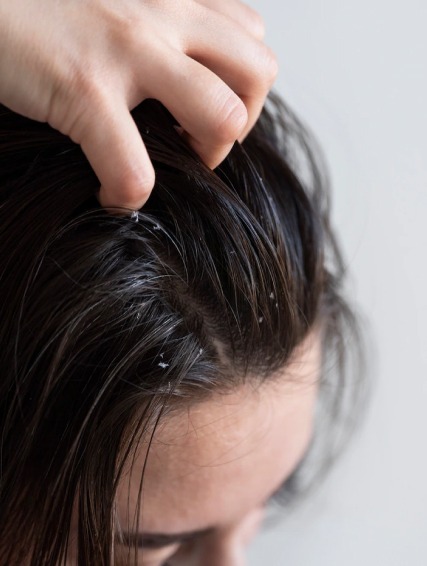
Itchy Scalp and Irritations
Dealing with an itchy scalp and irritations can be uncomfortable and bothersome. Itchy scalp can be caused by various factors, including dryness, dandruff, fungal infections, or sensitivity to hair products. To alleviate the discomfort and maintain a healthy scalp, it is essential to address the root causes and follow a proper hair care routine.
Causes of Itchy Scalp and Irritations:
Itchy scalp and irritations can result from:
+ Dry Scalp: Lack of moisture can lead to dry and itchy scalp, causing discomfort and flakiness.
+ Dandruff: An oily or dry scalp can contribute to the development of dandruff, leading to itching and irritation.
+ Fungal Infections: Fungal conditions like scalp ringworm can cause redness, itchiness, and inflammation.
+ Allergic Reactions: Some individuals may experience scalp irritations due to sensitivity to certain hair care products or ingredients.
Prevention and Care for Itchy Scalp and Irritations:
+ Keep Scalp Clean: Wash your hair regularly using a gentle and sulfate-free shampoo to keep the scalp clean and free from impurities.
+ Moisturize Scalp: Apply a moisturizing conditioner to your hair and scalp to hydrate and soothe dryness.
+ Use Anti-Dandruff Shampoo: If dandruff is the cause of itchiness, use an anti-dandruff shampoo with active ingredients like zinc pyrithione or ketoconazole to control flaking and relieve itchiness.
+ Avoid Allergens: Identify and avoid hair care products that may trigger allergic reactions or irritations.
If you’re interested in exploring potential solutions, please review the suggestions in the ‘Recommended Treatments’ section provided below, or feel free to reach out to our hair professionals for expert guidance.
Recommended Products
+ DRx Purifying & Scalp Refresh Shampoo
Recommended Treatments
+ DRx Purifying Hair & Scalp Therapy
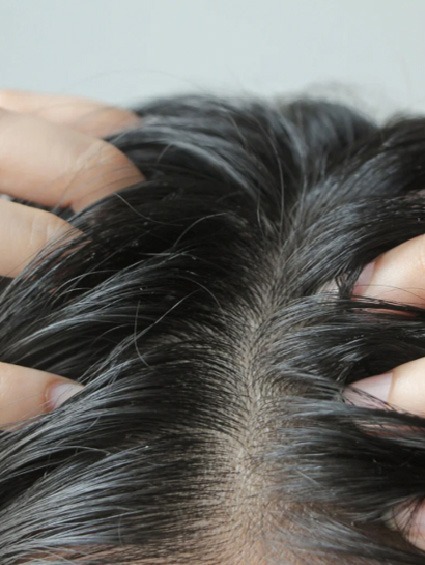
Greying
Dealing with greying hair is a natural part of aging, but it can also be a concern for many individuals who want to maintain their hair’s youthful appearance. Understanding the causes and adopting an appropriate hair care routine can help manage greying hair effectively.
Causes of greying hair:
+ Aging Process: As we age, the production of melanin, the pigment responsible for hair color, decreases, leading to grey or white hair.
+ Genetics: Genetics play a significant role in determining when and how quickly hair turns grey. Family history can influence the onset of greying.
+ Stress: High levels of stress can accelerate the greying process.
+ Nutritional Deficiencies: A diet lacking essential nutrients can impact hair health and contribute to premature greying.
Prevention and care for greying hair:
+ Balanced Diet: Consume a well-rounded diet rich in vitamins and minerals, particularly those that support hair health, such as vitamin B12 and biotin.
+ Stress Management: Implement stress-reduction techniques like meditation and exercise to minimize the impact of stress on hair color.
+ Gentle Hair Care: Use mild, sulfate-free shampoos and conditioners to maintain the overall health of your hair.
+ Hair Color Options: If you desire to cover grey hair, explore hair coloring options, such as natural or professional dyes, to achieve your preferred look.
Remember that greying hair is a natural process, and the approach to managing it varies based on individual preferences. Whether you choose to embrace your natural grey hair or seek ways to cover it, it’s essential to prioritize hair health and overall well-being.
Recommended Products
+ DRx Color Restoration Essence
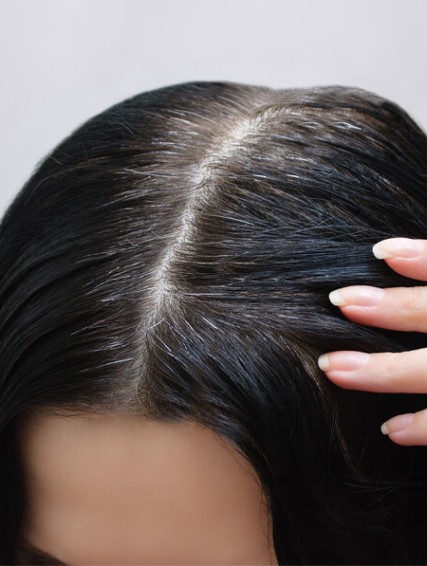
Hair Growth and Hair Health
Maintaining healthy hair growth and overall hair health is essential for luscious and vibrant locks. Hair growth can be influenced by various factors, including genetics, diet, lifestyle, and hair care practices. By adopting a well-rounded approach to hair care and making informed choices, you can support optimal hair growth and promote the health of your hair.
Factors Affecting Hair Growth and Health:
Hair growth and health can be influenced by:
+ Nutrition: A balanced diet rich in essential nutrients, such as proteins, vitamins (Biotin, B vitamins), minerals (iron, zinc), and omega-3 fatty acids, is vital for promoting healthy hair growth.
+ Scalp Health: A clean and well-nourished scalp provides a conducive environment for hair growth. Regular scalp care and proper circulation support healthy hair follicles.
+ Hair Care Practices: Using gentle hair care products and avoiding excessive heat styling and harsh chemicals can minimize damage and preserve hair health.
+ Hormonal Balance: Hormonal imbalances, such as those during pregnancy or menopause, can impact hair growth and lead to hair shedding.
Prevention and Care for Hair Growth and Hair Health:
+ Nutrient-Rich Diet: Ensure your diet includes a variety of nutrient-rich foods to support healthy hair growth. Incorporate leafy greens, lean proteins, nuts, seeds, and fruits into your meals.
+ Scalp Massage: Regularly massage your scalp to improve blood circulation, stimulate hair follicles, and encourage hair growth.
+ Hydration: Stay well-hydrated to support overall hair health and prevent dryness.
+ Limit Heat Styling: Minimize the use of heat styling tools and use heat protectant products when styling.
If you’re interested in exploring potential solutions, please review the suggestions in the ‘Recommended Treatments’ section provided below, or feel free to reach out to our hair professionals for expert guidance.
Recommended Products
+ DRx Purifying & Scalp Refresh Shampoo
+ DRx Intensive Regrowth Essence
+ DRx Colour Restoration Essence
Recommended Treatments
+ DRx Purifying Hair & Scalp Therapy
+ DRx Intensive Hair Regeneration (Meso)
+ DRx Intensive Hair Regeneration (Fractional)
+ DRx Advanced Hair Regrowth Complex (Meso)
+ DRx Advanced Hair Regrowth Complex (RF Fractional)
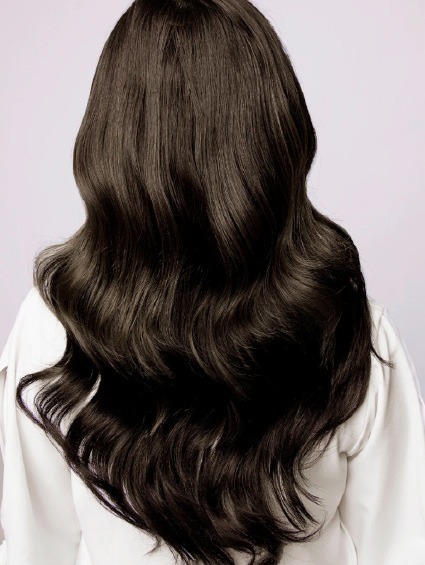
WHY OUR CUSTOMERS LOVE US
Find a treatment that suits you.
Unlimited Elements Error: Error in widget Select Dropdown Filter, You have some other plugin that loaded another version of twig. It's uncompatable with unlimited elements unfortunatelly.
Unlimited Elements Error: Error in widget Post Grid, You have some other plugin that loaded another version of twig. It's uncompatable with unlimited elements unfortunatelly.


